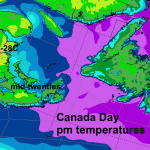
After the damp and cool June, July has been warm and dry. Almost halfway through the month, and most locations have only received 5mm or less. In fact, Charlottetown has yet to even reach one mm! Normal July rainfall totals are between 90 and 100mm; so we are significantly below normal to date.
Tropical cyclones are Mother Nature’s way of distributing moisture from the tropics to higher latitudes. My mentor, Rube Hornstein suggested that “in times of drought, all signs fail”. In other words, the weather pattern associated with dry periods can be stubborn to breakdown.
Since the storm is over the ocean, there is some additional uncertainty associated with the forecast track. Simply extrapolating the motion from satellite animations would suggest the centre passes south of Cape Breton, with that part of Nova Scotia most likely to receive some rainfall Tuesday night.
Looking at the satellite image, there is a low-level “eye” to the southwest of the rain area. This is an unfavorable alignment for any strengthening. In addition, as the system approaches Nova Scotia, it will weaken as it passes over cold water. Furthermore, winds to the north and west of tropical cyclones passing through our area are typically not very strong.
If we consult the computer weather models, the US and European models keep the remnants of Claudette well off shore, and only a few mm of rain over Cape Breton.
The Canadian model has the rain clipping Cape Breton, with peak amounts of about 15mm.
So, other than Cape Breton (which is still uncertain), it’s unlikely most Maritimers will see any moisture from Claudette. As well, it’s very unlikely winds will be strong.
On Wednesday (mostly afternoon and overnight), a couple of systems should provide some rain to most regions. Peak amounts may not be much more than 10-15mm… but still hard to say. It may be another 6 or 7 days after that before we see the next potential rainy system.
Environment Canada will be updating Information Statements on Claudette. Worth watching, but not worrying. After it passes, we’ll still need rain.






